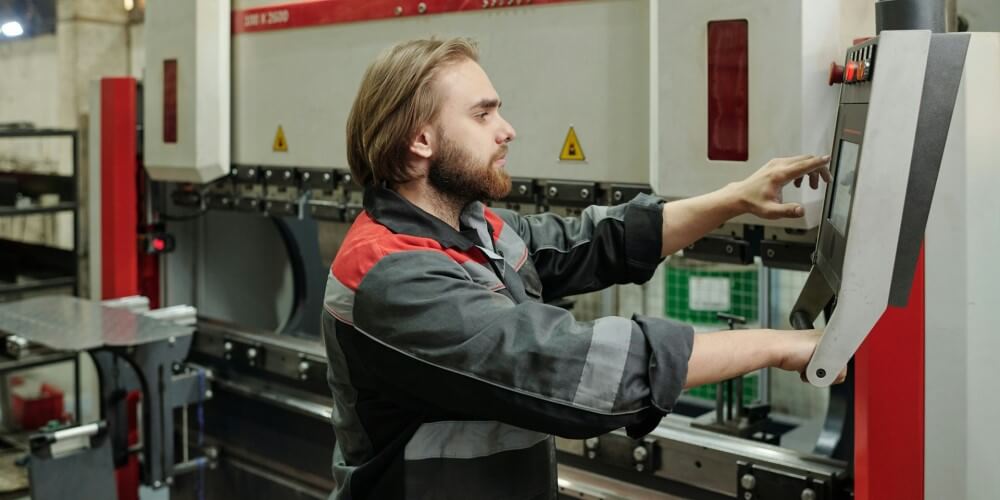Multiple studies have shown that job training programs in correctional facilities help lower recidivism rates. Inmates who participate in correctional education programs have a 43% lower chance of recidivating and a higher chance of finding employment after release than those who do not. High-quality education programs that teach in-demand skills can help learners achieve successful release and build successful careers outside of prison.
Let’s explore some qualities of effective correctional education programs and how NBS can support workforce development programs with industry-relevant credentials.
1. Collaborate With Industry Experts to Identify Key Skills
One factor contributing to the ongoing skills gap is the disconnect between education and industry. What’s taught in the classroom must align with the skills employers need on the manufacturing floor or construction site. An advanced manufacturing training program that doesn’t include the latest robotic programming skills will not prepare learners for successful careers.
Before beginning instruction, correctional education programs should collaborate with local employers and industry leaders to identify key skills that should be taught. Reviewing the curriculum and learning outcomes will identify any potential learning gaps and ensure the program aligns with real-world job requirements.
2. Include Simulated Workplace Environments
In addition to teaching industry-relevant skills, correctional education programs should include ways for learners to become familiar with a typical work environment. Individuals who already know their way around a workshop or construction site will feel more confident about their abilities and settle into the workplace sooner.
Of course, it can be challenging to simulate a workplace if the teaching environment is limited to a small classroom or lab space in a correctional facility. If possible, programs should incorporate the actual tools or equipment someone will use on the job. This is another area where programs benefit from industry involvement. Employers can advise on what equipment would be appropriate for training and where to source it. Future automation technicians can practice creating a pick-and-place program or troubleshooting errors with collaborative robots currently used in manufacturing facilities.
Augmented or virtual reality tools are another way to simulate larger workplaces. One of our partners, Promising People, developed a VR training program for electrical helpers. The VR component uses 3D video to demonstrate how to complete tasks like installing an outlet box or wiring a switch. The simulated environment mimics a typical job site so learners can get used to being on a construction site without leaving the training room. Students in the Promising People’s pilot program said they feel more confident because they know what needs to be done and how to do it before they show up for their first day of work.
VR training is also a practical choice for correctional facilities because of the strict regulations regarding inmates’ access to tools and the Internet. A VR headset with a secure, pre-determined training program is easier for educators to facilitate than carefully cataloging every screwdriver, tape measure, and pair of wire cutters.
3. Use Credentials to Validate Skills
Competency-based, industry-recognized credentials provide a clear measure of an individual’s skills and workplace readiness. The right credential benefits both job candidates and employers:
- For job seekers, a credential enhances a resume as an unbiased proof of skills and boosts confidence when reentering the workforce.
- For employers, the right credential signals that the individual has the relevant skills and knowledge to be successful on the job from day one.
At Nocti Business Solutions, we have partnered with many workforce development organizations to provide competency-based credentials. Our library of technical skills assessments includes tests for manufacturing, electrical, culinary arts, employability skills, and much more. We also provide certification development services for organizations developing new training programs.
The most accurate and unbiased credentials are those developed by an independent third party like NBS. A training program that creates its own credential is essentially a self-declaration of competence. The only way to guarantee fair, unbiased results is to work with an independent organization that specializes in high-quality assessments that measure skills according to industry standards.
NBS Helps Workforce Development Programs Train Skilled Workers
NBS is a nationally recognized credentialing body known for developing valid, reliable, and legally defensible technical assessments. If you are a nonprofit providing industry training in your community, please contact us to ask about our special Workforce Development Program. You may be able to leverage NBS technical assessments at a reduced price. If you would like to learn more about our credentials or how we help certify skilled workers, please send us a message or call 1-800-334-6283.

Recent Comments